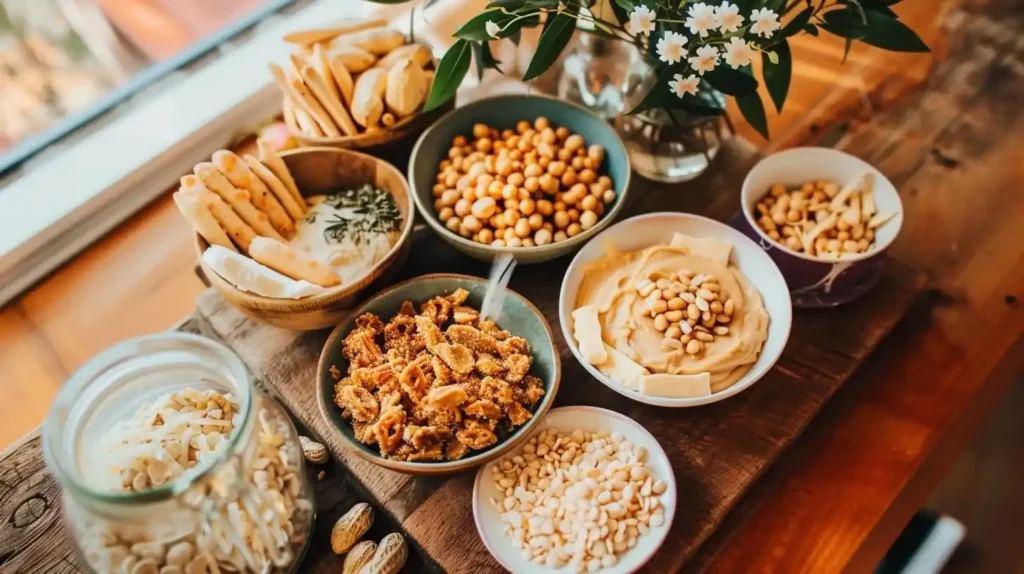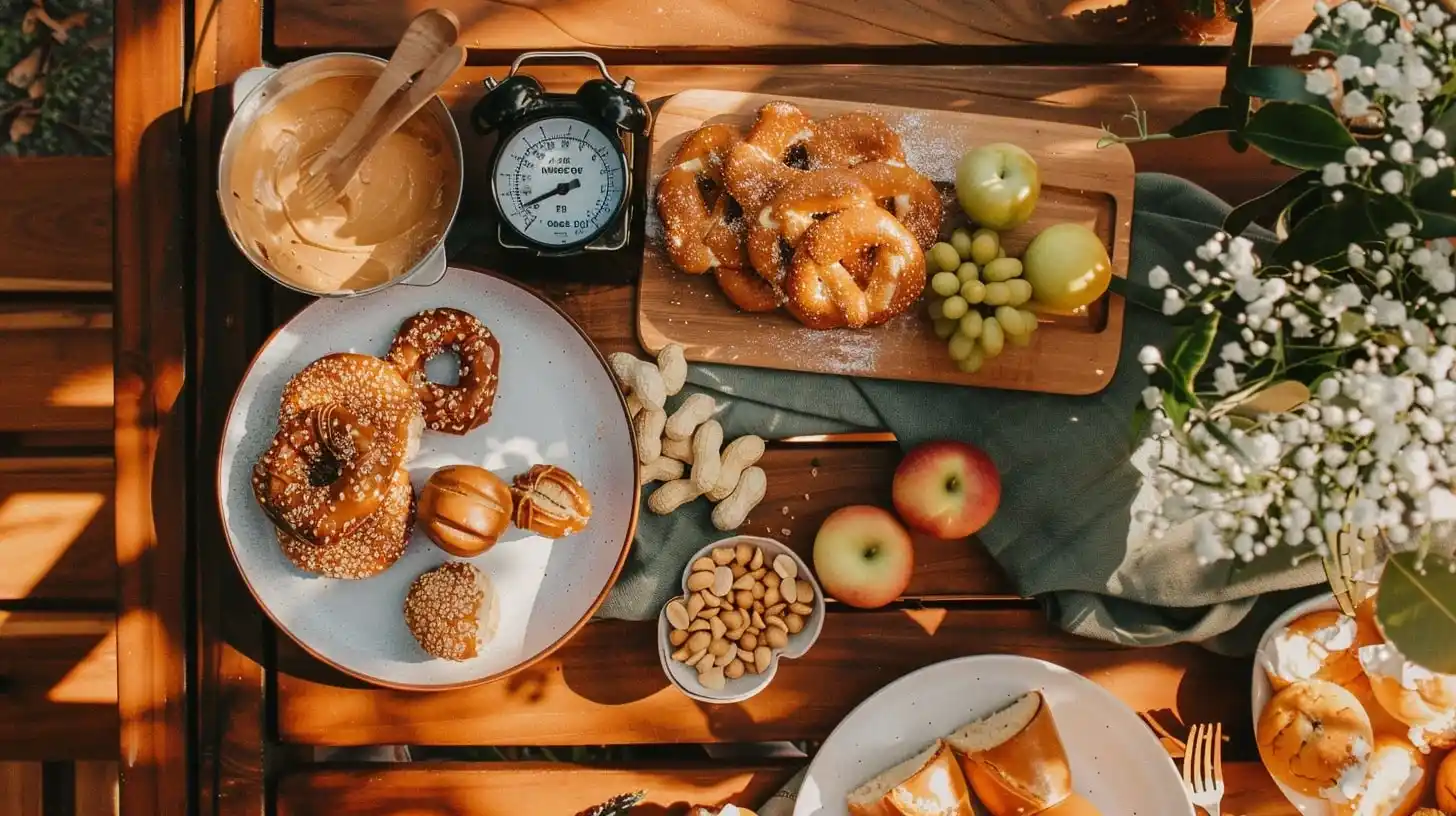“Mom, Is Peanut Butter Pretzels A Healthy Snack?” My nine-year-old daughter asked this question while holding up a bag of store-bought peanut butter-filled pretzel nuggets during our weekly grocery shopping. Standing in the snack aisle, surrounded by colorful packaging all claiming to be “wholesome” and “nutritious,” I realized this seemingly simple question required a thoughtful answer.
As a mother always searching for that perfect balance between nutrition and convenience, I’ve spent countless hours investigating whether family favorites like peanut butter pretzels truly deserve a place in our snack rotation. The answer, as with many nutrition questions, isn’t simply yes or no – it’s “it depends.”
Table of Contents
Why This Question Matters: Is Peanut Butter Pretzels A Healthy Snack?
Understanding if Is Peanut Butter Pretzels A Healthy Snack? matters for busy families trying to make better food choices. The combination of crunchy pretzels and creamy peanut butter creates an undeniably satisfying snack that both children and adults enjoy. But is peanut butter pretzels a healthy snack worthy of regular inclusion in your family’s diet?
- Protein content makes peanut butter pretzels more satisfying than plain pretzels alone
- Convenience factor appeals to busy parents seeking quick, portable snack options
- Kid-friendly taste ensures these snacks will actually be eaten, not wasted
- Varying nutritional profiles between store-bought and homemade versions affect their health value
- Portion control challenges can turn a potentially reasonable snack into a calorie concern
If you’re exploring various snack options like our, you might also enjoy our comprehensive guides to Cozy Breakfast Recipes: Effortless Morning Meals.
Is Peanut Butter Pretzels A Healthy Snack? The Nutrition Breakdown

The Protein Advantage: Why Peanut Butter Elevates Pretzels
When examining if Is Peanut Butter Pretzels A Healthy Snack?, the protein content stands out as a significant benefit. Plain pretzels offer little protein, but the addition of peanut butter provides approximately 4 grams of protein per serving, depending on the ratio of pretzel to peanut butter.
My son’s soccer coach once explained why Is Peanut Butter Pretzels A Healthy Snack? option for active kids – the protein helps with muscle recovery and provides longer-lasting energy than simple carbohydrates alone. This protein component means is peanut butter pretzels a healthy snack choice for keeping hunger at bay between meals.
Sodium Concerns: The Hidden Drawback
While considering if Is Peanut Butter Pretzels A Healthy Snack?, we can’t ignore their typically high sodium content. Store-bought varieties can contain 250-400mg of sodium per serving – a significant portion of the recommended daily limit.
When my daughter developed mild high blood pressure during her pregnancy, her doctor specifically mentioned limiting snacks like peanut butter pretzels. This experience taught me that although peanut butter pretzels might seem like a healthy snack option, the sodium content requires careful consideration, especially for those with health concerns.
The Sugar Situation: Not All Varieties Are Equal
Another factor when determining Is Peanut Butter Pretzels A Healthy Snack? involves sugar content. Many commercial brands add sugar to their peanut butter filling, transforming what could be a relatively healthy snack into a more dessert-like treat.
I learned this lesson when making homemade peanut butter pretzels with my children. Reading the ingredient list on our favorite store brand revealed added sugars I hadn’t considered. When evaluating if peanut butter pretzels are a healthy snack, checking for added sugars becomes crucial for making informed choices.
Calorie Density: Portion Control Matters
Is Peanut Butter Pretzels A Healthy Snack? from a calorie perspective? Both components – pretzels and peanut butter – are relatively calorie-dense foods. A typical 1-ounce serving of peanut butter pretzels (about 10-12 small filled pretzel nuggets) contains approximately 150-200 calories.
My personal experience taught me this lesson the hard way. While mindlessly snacking on peanut butter pretzels during a movie night, I consumed nearly three servings without realizing it. This experience highlighted that whether peanut butter pretzels are a healthy snack largely depends on portion awareness.
Ingredient Quality: Homemade vs. Store-Bought
Perhaps the most significant factor in determining is peanut butter pretzels a healthy snack comes down to ingredient quality. Store-bought versions often contain preservatives, hydrogenated oils, and artificial ingredients that reduce their nutritional value.
When my youngest developed some food sensitivities, we began making homemade peanut butter pretzels using whole-grain pretzel dough and natural peanut butter. This experience showed me that is peanut butter pretzels a healthy snack can largely depend on how they’re prepared and the quality of ingredients used.
The Verdict: Is Peanut Butter Pretzels A Healthy Snack?
After carefully considering all factors, Is Peanut Butter Pretzels A Healthy Snack? worthy of regular inclusion in your family’s diet? Here’s my nuanced conclusion:
Store-bought peanut butter pretzels can be considered an occasional snack rather than a daily health food. Their convenience makes them useful for busy days, but their typically high sodium, added sugars, and processed ingredients mean they shouldn’t be a dietary staple.
Homemade peanut butter pretzels, however, can certainly qualify as a reasonably healthy snack when made with whole-grain dough, natural peanut butter, and mindful portions. The control over ingredients significantly improves their nutritional profile.
As with most foods, moderation and quality matter most when determining is peanut butter pretzels a healthy snack for your family. They can absolutely fit into a balanced diet when approached thoughtfully.
Making Peanut Butter Pretzels Healthier: Practical Tips
If you’re wondering how to improve the answer to “Is Peanut Butter Pretzels A Healthy Snack?” for your family, I’ve discovered several practical strategies through years of kitchen experimentation:
- Make your own using our Homemade Peanut Butter Pretzels recipe, which allows complete control over ingredients
- Choose natural peanut butter without added sugars or oils when making or selecting peanut butter pretzels
- Look for whole grain pretzel options to increase fiber content, improving the overall nutritional profile
- Practice portion awareness by pre-portioning into small containers rather than eating directly from a large package
- Balance with fresh produce by serving peanut butter pretzels alongside fruit or vegetables to create a more nutritionally complete snack
Reader Questions About Peanut Butter Pretzels
Q: Is peanut butter pretzels a healthy snack for children?
When parents ask if peanut butter pretzels are a healthy snack for kids, I share my experience with my own children. They can be a better option than many heavily processed snacks, particularly if you choose varieties with minimal added sugars and reasonable sodium levels. The protein content makes them more satisfying for active children, but portion control remains important. For younger children, be mindful of the potential choking hazard of whole pretzel pieces.
Q: Is peanut butter pretzels a healthy snack for weight management?
Many people wonder if peanut butter pretzels are a healthy snack while trying to manage their weight. The calorie density means portion control is essential. I found success by pre-portioning a small amount (about 10 pieces) into containers rather than eating from the bag. The protein content can help with satiety, but mindless munching can quickly exceed calorie goals. If weight management is your priority, pair a small portion with high-volume, low-calorie foods like sliced cucumbers or bell peppers.
Q: How do homemade and store-bought versions compare?
When evaluating if Is Peanut Butter Pretzels A Healthy Snack?, the difference between homemade and commercial versions is significant. After making our family recipe from Sweet & Savory Treats, I compared the nutrition with our former store favorite. The homemade version contained about half the sodium, no added sugar in the filling, and no preservatives or artificial ingredients. While more time-consuming to prepare, the nutritional improvement is substantial.
When asking “Is Peanut Butter Pretzels A Healthy Snack?” the answer reveals an important nutrition truth: few foods are inherently “good” or “bad.” Instead, ingredient quality, preparation methods, and portion sizes transform the health value of most foods, including these savory-sweet treats.
I’ve found that approaching snacks with this balanced perspective helps teach my children about nutrition without creating anxious relationships with food. Peanut butter pretzels can absolutely be part of a nutritious diet when approached mindfully – and they’re certainly more nutritious than many alternative snack options that might tempt busy families.
With warmth, Sophia

